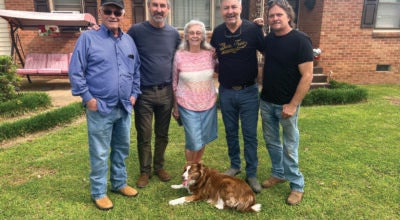Sardis loses tourism tax
Published 8:25 pm Tuesday, March 30, 2021
The Town of Sardis last week lost a crucial source of income when officials learned their application for renewal of the 3 percent tax levied on hotel occupancy and restaurant sales was denied.
Many cities and towns in Mississippi have a Economic Development and Tourist Tax approved by the Legislature that bring dollars into the municipality for a wide range of projects, all designed to improve the livability of a community.
Sardis’ share of the extra 3 percent collected on those two line items amounts to about $150,000 a year.
In Batesville, the income is an additional $1.5 million annually. Oxford stands to lose several million in extra taxes for projects if its renewal application meets the same fate as Sardis’.
The Legislature overwhelmingly voted to approve Sardis’ application, but a law attached to the provision allowing for local public and private legislation mandates the state representative covering that county vote for the matter.
In this case, State Rep. Brady Williamson voted against the renew of the Sardis application, killing the tourism tax income for the town.
The fallout was quick and predictable.
Several leaders sent statements in response to the vote:
“As a State Representative of low tax base communities like Como, Crenshaw, and Sardis, I realize the importance of revenue streams,” said Rep. Lataisha Jackson, who also represents portions of Panola County.
“With no groceries stores, car dealerships, or general stores within these communities, we have to rely heavily on other means to maintain our communities, infrastructure, and for development and other projects. Larger tax base communities like Senatobia, Oxford, and Batesville that most residents of our lower tax base communities shop in for groceries and cars and dine in benefit from the same type of tax structures additional to their larger tax base; therefore, I am appalled that my colleague fail to see the necessity for the Town of Sardis.
“It’s been a long standing policy of the MS House of Representatives that the local delegation must all agree and support local and privates.
“Former Rep. Nolan Mettetal and I were able to mutually support legislation that provided support for low tax base communities. It is unfortunate that my colleague Rep. Williamson and I cannot work collaboratively in these efforts,” she said.
From the Sardis Chamber of Commerce:
“It is very disappointing that State Rep. Brady Williamson has chosen not to renew the Economic Development and Tourism tax for Sardis. We feel that representative Williamson does not realize how crucial the funds from it mean to small communities like Sardis, mMost especially when a main purpose of economic development is to improve communities, which was also one of his campaign platforms.”
And from Panola Partnership CEO Joe Azar:
“If our elected official is truly not in favor of taxes, he should explore all ramifications before casting a vote to cut a tax. For example, if Batesville loses this economic development tax next year, the burden would likely be placed on Panola County. Our millage is already high, yet we would likely suffer another increase. These higher property taxes will stunt our economic growth and shrink disposable income – Econ 101.
On a state-wide level, if our elected officials don’t work to support other communities, they will not support ours. What’s important in Laurel, Mississippi, may not seem important in Batesville, but you can bet the folks in Jones County feel otherwise. Bottom line, when any community thrives in Mississippi, we all thrive.”
Azar also said he had listened to Williamson’s reasoning before vote.
“In a conversation on the day of the vote with this representative, I listened to his reasoning regarding the state income tax going away and raising sales tax. I explained to him that the state income tax would go away over a five-year period and an increase in sales tax would also come in stages. Why not vote ‘yes’ for a three-year extension when no damage could be done either way? All of this was explained in time to change the vote in favor of Sardis, but to no avail.”
Williamson also sent a press release explaining his position and vote.
He said he campaigned on the idea that taxes are too high and need to be cut wherever possible.
“At no point in my nine-month campaign, knocking on doors four days a week, meeting with public, rallies, debates, or meeting with leaders in the Legislature did I ever imply that I would be for the status quo on tax, for an increase in tax, or for the continuation of a tax that was voted for by some of the residents intended for a specified time period and for specific projects,” he said in the statement.
“I could change my vote, but I am not. For those whose projects and dreams are affected by this, please keep in mind the majority of my constituents would disagree with lists of expenses those tax dollars were spent on.
“Most of my constituents would prefer it be directly towards roads, bridges, law enforcement, workforce development, not abstractly tied to those expenses but directly.”
Williamson said he would consider a compromise on votes for future renewal applications (Batesville’s comes up next year) if the elimination of income tax becomes law in the future.
“I can and will justify at the earliest possible moment bringing any sales tax and use tax back to the Legislature and back to a vote by the residents,” Williamson said.






